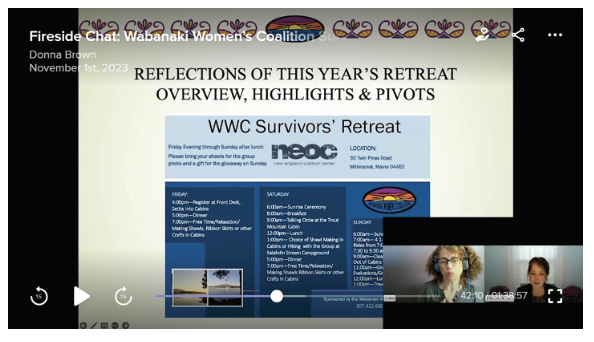Healing Camps to Fireside Sessions: Tillie Black Bear’s Legacy Continues
In October 2022, the National Indigenous Women’s Resource Center (NIWRC) launched a series of virtual Healing Camps webinars in honor of Tillie Black Bear and her legacy as the grandmother of the movement to end violence against Native women. The virtual series, created with the help and guidance of Tillie’s daughter, Connie Bushbreaker, featured 11 sessions focused on community care and healing for survivors and advocates like Tillie. Throughout the past year, NIWRC has presented seasonal Healing Camps. We are honored to carry Tillie’s work forward as we transition the Healing Camps into Fireside Sessions. This new iteration of virtual gathering will provide communal healing spaces for advocates and survivors by highlighting and uplifting Indigenous organizations’ work for healing.
During the Healing Camp events, held from October 2022 to August 2023, we could see how Tillie continues to inspire each of us as advocates. Here, we would like to share with you our reflections on the last two events: “Tillie Black Bear Women Are Sacred Seasonal Healing Camp: Biboon Anishinaabe-Mshkiki: Winter Anishinaabe Medicines” and “Fireside Session: Wabanaki Women’s Coalition Survivors’ Retreat Creation and Overview,” which carried Tillie’s spirit of advocacy. The knowledge shared within these events showcased how healing is varied and that all efforts to help ourselves and communities at large are essential.

Carmen Harrington (Sault Ste. Marie Tribe of Chippewa Indians) presented the “Biboon Anishinaabe-Mshkiki: Winter Anishinaabe Medicines” Healing Camp on August 23, 2023. Carmen shared her knowledge and resources with attendees by introducing the traditional plant medicines by their traditional and Latin names and reinforcing the importance of proper harvesting procedures when collecting and using plant medicines in terms of identification and ethical harvesting. As Carmen listed and displayed each plant collected from her community, she described ways to create tinctures or teas to help maintain health during the winter. The medicines identified were specific to the Upper Michigan Peninsula region and for the winter season. Carmen advocated finding local resources and creating connections with local plant knowledge keepers. Attendees were encouraged to seek out traditional medicines in healing journey spaces specific to their region. We acknowledge that finding ways to connect within Indigenous cultures is in and of itself a healing practice. As a communal space for healing, several attendees shared their knowledge of local and cultural plant medicine. Within Indigenous communal spaces, commonalities, connections, and stories are all part of healing journeys and heart-strengthens as a way for advocates, survivors, and an array of organizations to gather through Indigenous culture and perspectives.
Donna Brown (Penobscot Nation and Algonquin First Nation of Kitigan Zibi Anishinabeg), Executive Director of the Wabanaki Women’s Coalition, presented the “Wabanaki Women’s Coalition Survivors’ Retreat Creation and Overview” Fireside Session. The Wabanaki Women’s Coalition (WWC), located in Maine, was created in 2013 and has five domestic violence programs in its membership. Donna gave an overview of this year’s Survivors’ Retreat, which the WWC hosts annually. This retreat is specific to the region and focuses on the connection between survivors and advocates. The WWC Survivor’s Retreat is an entire weekend dedicated to survivors’ healing through cultural connection, connection to the land and water, and connection with each other as relatives. An elder opens and closes the retreat, and activities such as shawl-making, hiking, and kayaking encourage relatives to connect with one another. The overarching theme is giving survivors agency in deciding on what they participate in while in the safe company of relatives.
After giving an overview of the retreat itself, Donna discussed the process for planning such an event. She listed each part of the planning process to empower organizations and advocates to create similar events for their communities. Logistics such as deciding on a venue/location and transportation were touched on, as well as other considerations like making sure survivors felt safe and supported while away from home. Throughout each presentation, people commented with their own perspectives unique to their region, Indigenous background, and professional experience.
Programs and organizations like the WWC are crucial in implementing prevention services rooted in Indigenous perspectives and culture. Federal grants can assist in these efforts. For example, the Office on Family Violence Prevention and Services (OFVPS) provides funding to Tribes and Tribal organizations to assist Tribes in efforts to increase public awareness about and primary and secondary prevention of family violence, domestic violence, and dating violence and to provide immediate shelter and supportive services for victims of domestic violence and their dependents. In 2023, OFVPS made awards to over 250 federally recognized Tribes and Tribal organizations totaling $26,637,500. The Office on Violence Against Women (OVW) funds Tribal coalitions with the Grants to Tribal Domestic Violence and Sexual Assault Coalitions Program, “In 2023, OVW gave out 20 awards totaling over $7.64 million.”1 Funding and other resources directed toward programs like the Wabanaki Women’s Coalition can strengthen communities within Indian Country by providing education, support, and technical assistance. Culturally specific programs can create more opportunities for Tribal communities that target their unique needs and pathways to healing.
As NIWRC transitions from the virtual Healing Camps into Fireside Sessions, the continual thread of creating healing spaces for advocates and survivors is ever-present. In these spaces, we will also continue with the mission of addressing disparities Indigenous women face and bringing efforts to restore sovereignty to strengthen the safety of Native women.

See logo above.





